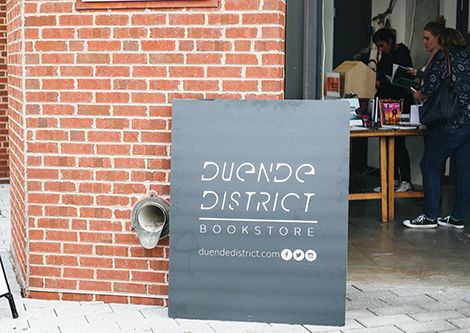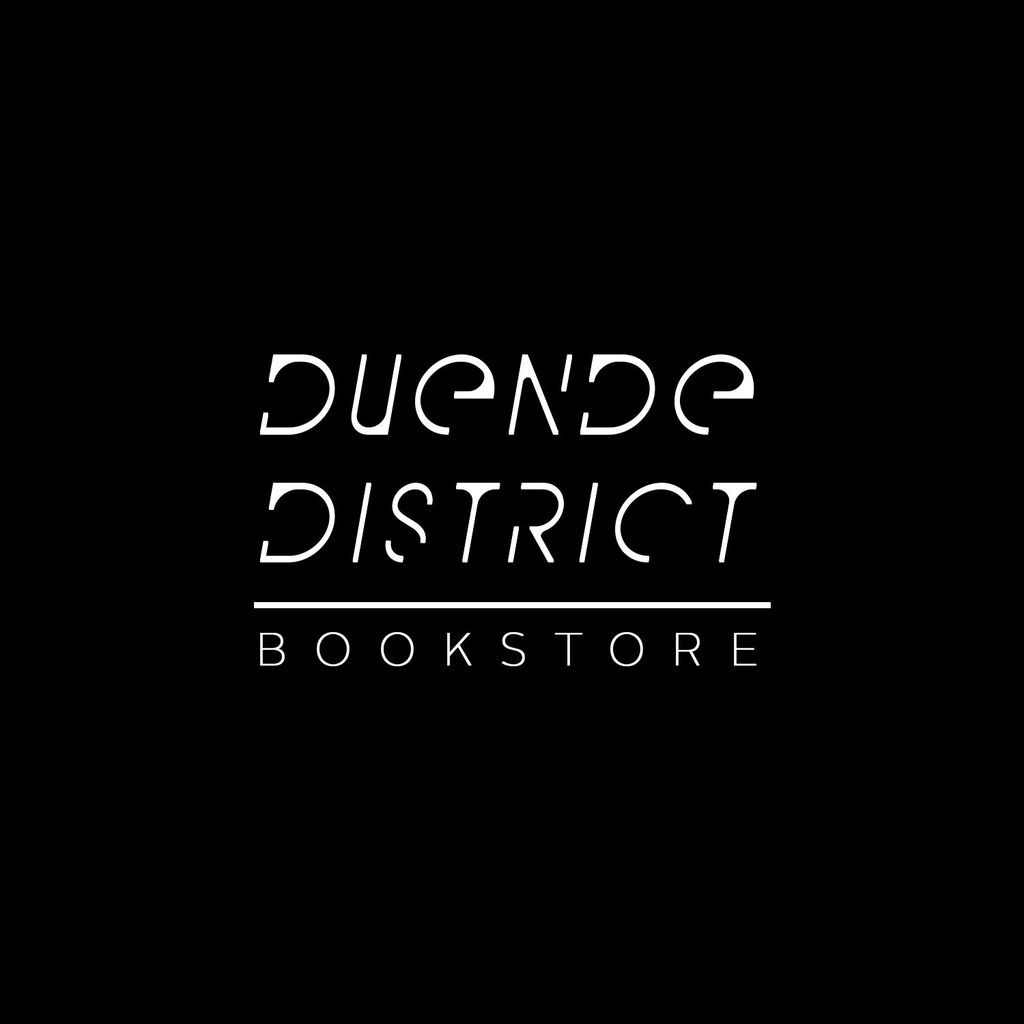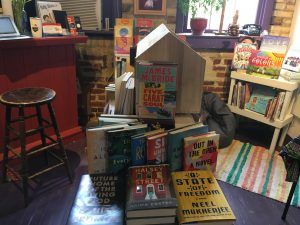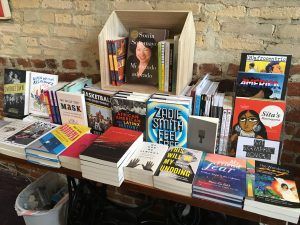
How PoC-Only Bookstore Duende District is Changing the Game
In April of 2017, poet Angela Spring launched a Kickstarter campaign for a radical idea: a mobile bookstore that only sold work by people of color. A veteran bookseller and former manager of DC favorite Politics & Prose, Spring knew that her diverse city was missing a place that catered to communities of color. She knew that these books needed to get into the hands of people who needed them in an inviting, accessible way; a place that empowered the neighborhood and brought together communities that were underserved.
Duende District now has three pop-up locations in the DC area, hosts events and author readings, and is a rapidly growing force for change. Not only has Duende District stuck to their motto of “Todas Las Voces—All voices,” but it presents a unique, alternative concept of what a bookstore can be.
 When you started to put together the concept for Duende District, what are some things that were important for you to center around?
When you started to put together the concept for Duende District, what are some things that were important for you to center around?
In the beginning, when Duende District was just an idea, I knew the biggest component needed was for it to be a bookstore centered around people of color, not just in the periphery, as it is in most bookstores. Sometimes we’re not even in the periphery. I have worked in many stores across the country, and too few people of color work in senior-level positions or own bookstores. And the people I worked with are amazing. I want them to have every opportunity. I believe in helping people up with you. I wanted to create a space where people of color were unhindered by institutional racism and can shine their own light onto a project they believe in.
I also wanted to redefine bookselling and flip the model of what a modern bookstore could and should be. As it exists now, the traditional model of building a bookstore business precludes a level of cultural, societal and monetary privilege that high-level book culture does not make it to communities of color and keeps people like myself, with a load of accumulated debt (student loan) or otherwise, from accessing bank loans or financing. If we can find a better, less financially burdensome way to building these stores, then we open up the bookstore industry to true inclusion and bring high-quality book culture to communities that haven’t had it before.
What do you feel are some of the benefits of a pop-up model? What do you think you lose or gain by not having a single set location?
The main benefit is very low overhead, which is the financial ballgame for a bookstore, and increased mobility and visibility. I call Duende District a “collaborative pop-up bookstore,” and what we do is build on the foundation of the concept of the community bookstore by collaborating with community organizations to create these PoC bookstore spaces. While the pop-up shop is by no means a new thing, or the pop-up bookstore, I’ve just made it smaller and streamlined it. I focus on frontlist (new), a little backlist that I personally love, and basically set it up as a frontlist/display store with depth that I can create in any space 500 sq ft or under.
I constantly develop my model because with each pop-up, I learn new things. And with the launch of two long-term collaborative pop-ups (which I call mission-based vendor boutique bookstores) with MahoganyBooks and Toli Moli, I’ve expanded Duende District’s reach in a sustainable way. And I use the pop-ups for research to see which neighborhood not only wants a bookstore but if they are willing/able to financially support a bookstore.
The only thing I really lose by not having a set location for the larger pop-up is the ability to settle into one place. The flipside to that, however, is I’m not locked into a location where either the community doesn’t support me or a landlord has decided they want a more viable business or they jack up the rent or the neighborhood demographics change too rapidly. These reasons have been many a bookstore’s death knell.
How do you go about deciding on locations?
My whole process is organic. I’m a people person and I love meeting new people and learning about what they do. So my pop-up locations are decided by people who love what Duende District is and want to find a way to bring it to their community. I have a general sense of areas I want to get into but I don’t force it. And so far, this method has led me very well.
How do you curate your collection? I’m assuming that since you have a limited amount of space, you’re making specific selections about what to carry in your store. What are some things that you look out for during the buying process?
I spend hours upon hours going through publisher frontlist catalogs, reading galleys, looking up book reviews, and following up on PoC book influencers’ recommendations on social media. It’s vital to me that since my stock is so limited, that each selection be fierce and brilliant. I focus on literary fiction, memoir/essays, poetry, graphic novels, romance, speculative fiction and children’s books, all in English and Spanish.
There’s already a limited selection of books written or illustrated by people of color, but I want the best. I want books that look gorgeous on display and when you open them up, they blow you away. They’re books that are powerful, evocative, delightful, breathtaking. They are exceptional books. And they are all by people of color because our stories are not just stories told solely through the lens of our oppression or history. And I want to make sure those books are as representative of all PoC cultures as possible.
Are there any trends you’ve noticed with people who come into your store? Are they looking for anything specific? What flies off the shelves? What are some great customer experiences you’ve had?
When people of color come into my store, it’s often a marvelous thing. They look around and talk to me and realize all these books are for us. We’re not often made to feel special and hardly any literary spaces are created for us. What I sell tends to vary location to location, but children’s picture and board books always sell excellently. People are always looking for kids’ books that are representative.
Honestly, 9 out of 10 of my customer experiences are amazing. I love my customers so much. They’re my community and their support buoys me, makes me get up everyday even when I’m exhausted and work even harder.
What are some of the joys and struggles of running a PoC-only bookstore?
Again, the joys are all the amazing fellow PoC I’ve met that support me and who are doing absolutely amazing things, as well. I love collaborating with these people, they’re the best. Derrick and Ramunda Young of MahoganyBooks and Simone Jacobson and Eric Wang, the owners of Toli Moli in Union Market, are all brilliant. I am blessed to be in their orbit in to create literary spaces with them.
The struggle really only comes from the frustration of knowing we have so far to go in hiring PoC throughout the publishing and book industries so we can get more books published and championed. Again, not just stories told about our struggles and oppression or about our historical figures, but our stories. I want to read adult trade books that make me feel an entire range of emotions, not just heavy/angry/sad. Where’s our Donna Tartt or David Sedaris? And also, people are not a trend. I cannot say this enough. I love that several Dominican-heritage writers are getting books published this year, but we aren’t vampires or zombies—these books should be published all the time because they’re amazing, but it worries me to see us being reduced to “trends”—oh, this is the year we publish X-kind of Latinx books! Oh my god, NO. Stop it, publishers. Stop de-humanizing us that way.
 Why do you feel it is important to have a place specifically for people of color? How have you seen the effects on your community?
Why do you feel it is important to have a place specifically for people of color? How have you seen the effects on your community?
I want a place specifically for people of color because I’ve never had one. I grew up in bookstores but never realized how those spaces showed me how un-seen and un-heard I was. If I’d stepped into a bookstore like Duende District as a child, I might have grown up in a completely different way. Just like if I’d read The Poet X by Elizabeth Acevedo as a 16-year-old, I could have been a different person.
We deserve this. We deserve a beautiful, warm literary space full of books about us, our experiences, our lives, our stories, written by us. A space that celebrates all of us, black and brown, from every shade and walk of life.
I don’t really know what the effects on my community are but I know people always want to collaborate with me to bring Duende District to new places. If someone wants Duende District in their community, I will find a way to make it happen in some capacity. So I hope that means it’s having a good effect on my community!
What are some of your hopes and goals for Duende District?
I’ve tabled a brick and mortar at the moment because I’m looking at expanding Duende District beyond the D.C.-Maryland-Virginia area. I have switched to multi-month pop-ups for the bigger, roving pop-up. I really want to take this mission and store to as many communities as possible, especially back to my home state of New Mexico.
What do you have coming up that you’re excited about?
Our next pop-up takes me back to Virginia, in Alexandria, with the Torpedo Factory, in May and June. I’m excited to connect with a new community. Then I’m planning on returning to one of my most supportive communities for a 3- or 4-month pop-up in the fall. I’m also looking at the possibility of opening up up to two more long-term pop-ups in the DMV area before setting my sights westward.
DC Rioters can find Duende District at BloomBars in Columbia Heights until April 8, at MahoganyBooks in The Anacostia Arts Center, and at Toli Moli in Union Market.
Check out duendedistrict.com for more information, and check them out on Facebook, Twitter, and Instagram
Looking for more bookish things to do in Washington DC? Check out Literary Tourism: A Book Lover’s Guide to Washington DC
 When you started to put together the concept for Duende District, what are some things that were important for you to center around?
When you started to put together the concept for Duende District, what are some things that were important for you to center around?

 Why do you feel it is important to have a place specifically for people of color? How have you seen the effects on your community?
Why do you feel it is important to have a place specifically for people of color? How have you seen the effects on your community? 













